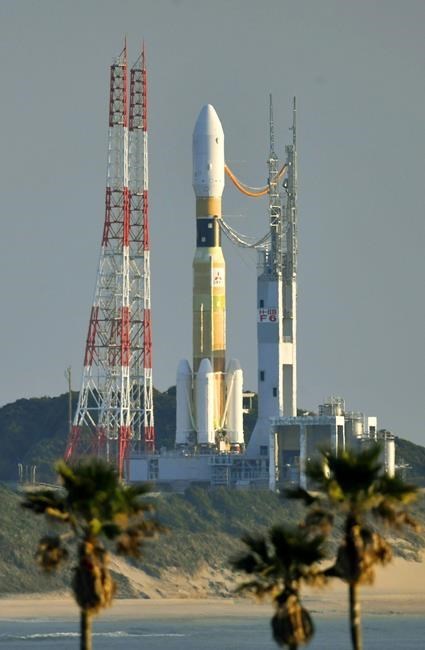
Japan's H-IIB rocket with a capsule called Kounotori, or stork, waits for liftoff at the Tanegashima Space Center in Tanegashima, southern Japan, Friday morning, Dec. 9, 2016. The Japanese capsule was launched late Friday evening with much-needed supplies to the International Space Station. The Kounotori contains nearly 5 tons of food, water and other supplies, including new lithium-ion batteries for the station’s solar power system. (Ryosuke Uematsu/Kyodo News via AP)
Republished December 09, 2016 - 8:51 AM
Original Publication Date December 09, 2016 - 5:50 AM
CAPE CANAVERAL, Fla. - A Japanese capsule blasted off with much-needed supplies for the International Space Station on Friday, a week after a Russian shipment was destroyed shortly after liftoff.
The Russian rocket accident and the grounding of one of NASA's commercial suppliers make this delivery all the more urgent. The spacecraft should arrive at the station Tuesday.
"Have a safe flight," French astronaut Thomas Pesquet said in a tweet from the space station. "Looking forward to your arrival!"
The capsule — called Kounotori, or white stork — contains nearly 5 tons of food, water and other supplies, including six new lithium-ion batteries for the station's solar power system. Astronauts will conduct spacewalks next month to replace the old nickel-hydrogen batteries that store energy generated by the station's big solar panels.
This is Japan's sixth shipment to the 250-mile-high outpost, currently home to Pesquet, two Americans and three Russians. It launched from Tanegashima Space Center in southern Japan.
Launches by SpaceX, meanwhile, have been on hold since a September rocket explosion on the pad in Cape Canaveral, Florida. The helium pressurization system in the rocket's upper stage was breached, resulting in a massive fireball.
The company hopes to resume flights next month from Southern California. Iridium Communications satellites will be aboard that initial launch. A space station supply run is supposed to follow a few weeks later from Cape Canaveral.
In a televised interview from the space station following Friday's launch, NASA astronaut Peggy Whitson said there are already enough supplies to last until spring. The Japanese shipment will stretch that out even further. The Russians lost a spacesuit in the Dec. 1 launch accident, among many other items, she noted.
"Spaceflight's not an easy thing," Whitson said. "We just have to keep pressing ourselves to do the right thing, make sure we're doing all the right tests ... so that we don't have these problems."
___
Online:
NASA: https://www.nasa.gov/mission_pages/station/main/index.html
News from © The Associated Press, 2016